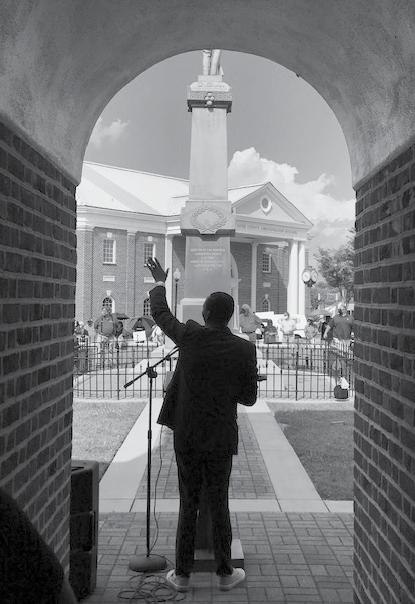
4 minute read
Temple Solel Peacefully Protests
Do the words “peaceful” and “protest” go together? They did on June 7 in Lancaster, SC, when multiple leaders from the surrounding communities shared words of prayer, vigilance, support, and acknowledgment of the painful experiences that our Black neighbors and friends are experiencing.
As Jewish people, we too understand within our own history and in present times what slavery, bigotry, and hatred do to bring pain upon groups of people. Even as recently as this month, a worker was in my home and asked me, “Are you Jewish?” I answered, “Yes.” He said, “Are you going to try and jew us down so you can pay less?” I controlled my reaction but still felt defensive. “Why would you say such a racist comment to me in my own home? You couldn’t be more wrong. A majority of Jewish people strive to be known as generous, philanthropic, kind, and supportive people.” It also served as a sobering example to me that at that moment these were “just” word-exchanges. I did not fear for my life. Our Black brothers and sisters fear for their lives.
Hearing discussions taking place about racism on the news, online, and television specials reminds me of how many challenges we still face. What we have in common as human beings is wanting to be free from fear, rejection, mistreatment or abuse. We want to be respected, listened to, valued, treated fairly, and accepted for who we are.
Many groups experience discrimination based on inherent qualities such as race, gender, cultural or economic background, age, sexual orientation and more. Other groups experience discrimination, as well. How are those with disabilities treated? Or those living with addictions, depression, PTSD, or hoarding? What other groups experience discrimination that we might not even be aware of?
There are other topics that come to mind that contribute to breakdowns in our society; some are hidden and horrible secrets — domestic battering, violence, and sexual assault. We owe it to ourselves each day to turn away from divisiveness, choosing instead to be peacemakers by practicing de-escalation even within our own families and friends. We can commit personally to do our part to model behavior that leads to resolution.
Shortly after my personal experience with antisemitism, I received a call from Reverend Sh’Kur Francis of Grace United Methodist and Lynwood United Methodist churches. He asked if I would represent the South Carolina Jewish Community by leading a prayer of support to the Black Community at a Peace Protest. “Everybody should be a part of the conversation to build a better country and a better society,” Francis said. “It’s a wonderful way for us to come together as one to pray, listen, plan, create, and deepen our relationships.”
We must stand “side-by- COVID-19-side” — Black, White, Hispanic, political figures, Christian, Islamic, Jewish, Atheists, or non-religious affiliated people. What follows is an excerpt from the speech and prayer I shared in front of that Historical Courthouse in downtown Lancaster, SC. It was an honor to state loudly —
“The Jewish Community in South Carolina will not tolerate racism. It is wrong. We are ‘Echad,’ one people; we stand together today because we must see change demonstrated not just spoken about. Deuteronomy 6:4 holds a sacred prayer we call the ‘Sh’ma.’ Today, as you hear voices singing this prayer, consider how we can allow God to be alive in our heart, we can ‘Baruch Atah Adonai and Va-anachnu Korim’ (bend our knee) as a symbolic act that we must stop racism in all its forms.
“Let’s see this ancient symbol of kneeling with new strength and new power — the power to drive change together as one people with God’s hand upon our shoulders, giving us the courage to do what is right and true with civility. Let us also hold onto the promises in another sacred text found in Jeremiah 29:11–13, ‘For I know the thoughts that I think towards
you, says the LORD, thoughts of peace, and not of evil, to give you a future and a hope. You shall call upon Me in prayer, and I will listen. You shall seek Me, and find Me, when you search with all your heart.’
“God hears your cries, feels your anger, and is the one who can wipe the tears from your eyes. What we are demonstrating in our own community today is our hope together.”
Temple Solel holds regular Shabbat services at 7 p.m. on the second and fourth Fridays of each month via Zoom during the pandemic and hopes to resume services when appropriate at Belair UMC Family Life Center, 8095 Shelley Mullis Rd., Fort Mill, SC 29707. For more information see templesolelSC.org, write us at info@ templesolelsc.org or call 803- 610-1707.






